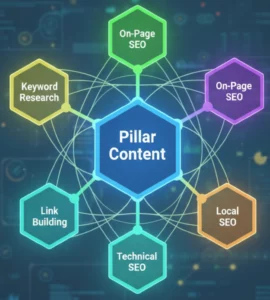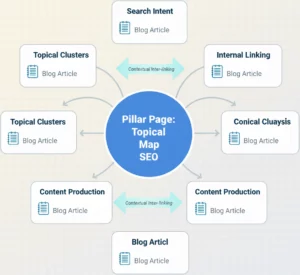
“What is SEO strategy?”
The SEO strategy, or Search Engine Optimization, is a plan of action designed to improve a website’s visibility in search engines. In other words, it optimizes a website so that it appears at the top of search results for specific keywords. When you search for a topic on Google, Bing, DuckDuckGo, Ecosia, etc, there’s a high probability that the first sites appearing during your search have optimized their pages to appear in the top results. This strategy includes various techniques and strategies, all focused on improving a website’s page ranking on Google and other search engines.
Table of Contents
ToggleWhy is SEO strategy crucial?
SEO strategy is essential for several reasons. Firstly, it is well-known that most internet users only look at the first page of search results. So, if your site doesn’t appear on this first page, it’s unlikely to receive much organic traffic. Lastly, a good SEO strategy can help increase your site’s credibility and authority. Users are more likely to trust a site that is ranked high in search results.
Furthermore, an effective SEO strategy can lead to an increase in traffic to your site, which can translate into increased sales and revenue for your business. Finally, SEO is generally less expensive than other forms of online advertising, such as Pay-Per-Click (PPC – Pay-per-click advertising), or SEA (Search Engine Advertising – The use of advertisements directly on the search engine). That’s why many SEO agencies offer SEO services to their clients. A good SEO strategy can be more effective than all the online advertising campaigns you will carry out.
The components of an SEO strategy
An SEO strategy typically includes the following elements:
- Keyword research: This crucial step involves identifying the words and phrases that your target audience uses when they search for products, services, or information similar to what you offer.
- On-page optimization: It refers to optimizing elements of your website that are directly under your control, such as content, URL structure, title tags, meta descriptions, etc.
- Off-page optimization: It includes activities that take place outside of your website but can affect its ranking, like link building.
- Technical optimization: It involves improving the technical aspects of your website, like loading speed, mobile adaptability, indexing, etc.
- Content creation: A strong content strategy is at the heart of any SEO strategy. It’s about creating quality content that’s relevant and useful for your target audience.
SEO is a long-term process. It’s rare to see instant results. Instead, SEO requires a long-term commitment, patience, and constant monitoring to ensure success.
To learn more about our approach to SEO strategy, you can visit our About page.
Choosing an SEO agency for your SEO strategy
Choosing a SEO agency to help develop and implement your SEO strategy can be a tricky task. There are many agencies that offer SEO services, and it can be challenging to determine which one is best for you. To assist you in this process, we’ve listed some points to consider when choosing an SEO agency below.
- Experience and expertise: Look for an agency that has experience in your industry and a proven track record of results.
- Services offered: Make sure the agency provides the services you need, like keyword research, on-page optimization, link building, etc.
- Transparency and communication: A good agency should be transparent about the tactics it uses and be able to clearly communicate the progress made.
- Transparency and communication: A good agency should be transparent about the tactics they use and be able to clearly communicate progress.
- References and testimonials: Look at testimonials from previous clients to see if they were satisfied with the agency’s services.
The SEO strategy is an essential component of any successful online marketing strategy. Whether you choose to do it yourself or hire an SEO agency, understanding the basics of SEO helps you to develop a strategy that matches your business goals.
FAQ (Beginner)
1. How long does it take to see results with SEO?
SEO is slow, and it is rare to see immediate results. Generally, it takes between 3 to 6 months to see significant changes in your ranking on search engines.
2. Is SEO still important?
Yes, SEO is more important than ever. As online competition continues to grow, having a solid SEO strategy in place is crucial to help you stand out and attract organic traffic to your site.
3. What is on-page and off-page optimization?
On-page optimization involves factors of your website that you can directly control, such as content, URL structure, title tags, etc. Off-page optimization, on the other hand, refers to actions you can take outside of your website to improve its ranking, like link building and social media marketing.
4. What does an SEO agency do, concretely?
An SEO agency helps businesses improve their online visibility by optimizing their website for search engines. This may include services like keyword research, on-page optimization, link building, competition analysis, purchasing backlinks. Remember that an SEO agency is generally highly experienced in their field and offers a high level of expertise.
5. Why should I hire an SEO agency rather than doing SEO myself?
SEO can be complex and time-consuming, and it requires specific expertise to be done correctly. An SEO agency has the expertise and tools necessary to develop and implement an effective SEO strategy. Moreover, hiring an agency allows you to focus on other aspects of your business.
If you want to get in touch with us to learn more about our SEO services, don’t hesitate to visit our Contact page.
In fact, the SEO strategy is a constantly evolving field. Search engines regularly update their algorithms, so it’s crucial to stay up-to-date with the latest SEO trends and techniques. This is where an SEO agency can really make a difference, as they are up-to-date with the latest SEO best practices and can help you adapt your strategy accordingly.
Now that we have covered the basics of SEO strategy, let’s delve into some key concepts and share 5 practical tips to improve your SEO.
In-depth Keyword Research
Keyword research is the foundation of any SEO strategy. The goal is to identify the terms your target audience uses when they’re doing online searches. Here are some tips for conducting effective keyword research:
- Use keyword research tools: Tools like Google Keyword Planner, SEMRush, or Ahrefs can help you find relevant keywords for your business.
- Understand search intent: Search intent is the purpose behind a user’s search. For example, someone searching for “best smartphone 2023” probably intends to buy a smartphone, while someone searching for “how to fix a smartphone screen” is probably looking for instructions or advice.
- Consider search volume and competition: Ideally, you want to find keywords with a high search volume and low competition. This means that there are many people searching for these keywords, but few sites ranking for them.
Optimizing your content for SEO
Once you’ve identified your keywords, the next step is to optimize your content. Here are some tips:
- Include your keywords in titles, subtitles, meta descriptions, and naturally throughout the content. However, avoid keyword stuffing, which can lead to Google penalties.
- Write quality content: Content that is well-written, informative, and useful is more likely to be shared and generate traffic.
- Use images, videos, infographics, etc. to make your content more engaging and share information visually.
Enhancing User Experience (UX)
User experience is increasingly important for SEO. On the other hand, Google has indicated that UX is a ranking factor, so you want to ensure that your site is easy to use, fast, and offers a pleasant experience for visitors. Here are some tips:
- Improve your site speed: A site that loads quickly is essential for good UX. Use tools like Google PageSpeed Insights to check your site speed.
- Make your site mobile-friendly: More and more people are browsing the internet on their phones, so it is crucial that your site is optimized for mobile devices.
- Ensure your site is easy to navigate: A well-organized site with clear navigation helps users find what they are looking for quickly and easily.
As we mentioned in the previous article, SEO is a long-term process that requires regular monitoring and adjustments. It is also important to keep up with the latest trends and updates from the Google algorithm. By investing time and effort in SEO, you can improve your site’s visibility, attract more organic traffic, and ultimately increase conversions and sales.
FAQ (beginner)
1. How do I track the success of my SEO strategy?
There are several tools, like Google Analytics, that allow you to track your site traffic, the sources of this traffic, conversion rates, and other key performance indicators (KPI). It is also useful to track your ranking on search engines for target keywords.
2. What is a backlink and why is it important for SEO?
A backlink is a link from another website to yours. Backlinks are important for SEO because they signal to search engines that your content is relevant and of quality. The more high-quality backlinks you have, the better your ranking will be.
3. How can I get more backlinks for my site?
There are several strategies for obtaining backlinks, such as creating quality content that people want to share, sending link requests to other websites, participating in industry events or forums, and more.
4. What is local SEO and how does it differ from traditional SEO?
Local SEO is a search engine optimization strategy that aims to increase a business’s visibility in local searches. This includes techniques like optimizing your Google My Business listing, earning positive reviews, and optimizing your site for local keywords.
5. What is mobile SEO and why is it important?
Mobile SEO is optimizing your website for mobile users. As a large part of internet traffic comes from mobile devices, it’s crucial that your site is easy to use on a smaller screen. This includes factors like loading speed, responsive design, and optimizing the text size and buttons for touch screens.
Analysis and monitoring of your SEO performance
The first step to improving your SEO is to measure how you are currently doing. There are many tools available for this, including Google Analytics, Google Search Console, and various third-party SEO platforms.
Here are some of the most important key performance indicators (KPIs) to track:
- Organic traffic: This is the number of visitors who come to your site via unpaid search results.
- Keyword ranking: This is the position of your site in the search results for specific keywords you are targeting.
- Bounce rate: This is the percentage of visitors who leave your site after viewing only one page. A high bounce rate may indicate that your content is not relevant or useful to visitors.
- Conversion rate: This is the percentage of visitors who perform a desired action on your site, such as signing up for your newsletter, downloading a white paper, or making a purchase.

Continued optimization of your SEO
Once you have an idea of your current performance, you can start making improvements. Keep in mind that SEO is a long-term process that requires constant optimization and adaptation. Here are some suggestions:
- Continue to produce quality content: Regularly creating relevant and useful content will help improve your ranking, attract more traffic, and engage your audience.
- Optimize existing pages: If some of your pages have a high bounce rate or a low conversion rate, it may be helpful to review and optimize the content.
- Improve user experience: A fast, easy-to-navigate, and mobile-friendly site can improve your SEO and increase conversions.
- Get more backlinks: Quality backlinks can greatly improve your SEO. You can get backlinks by creating quality content that people want to share, establishing partnerships with other sites, or using other link-building techniques.
Keep up with SEO trends
The world of SEO is constantly evolving, so it’s important to stay up-to-date with the latest trends and algorithm updates. Some aspects to watch might include Google algorithm updates, new search engine features, and emerging trends like voice SEO or AI SEO.
By engaging in a continuous cycle of analysis, optimization, and competitive intelligence, you can not only improve your SEO but also adapt to market changes and remain competitive.
Conclusion
SEO is a critical component of online marketing, but it can be complex and demanding. By understanding the basics, deepening your knowledge, implementing solid strategies, and regularly measuring your performance, you can create an SEO strategy that improves your site’s visibility, increases traffic, and promotes your business’s growth.
This guide has allowed us to give you a comprehensive introduction to SEO, but there is always more to learn.
Thank you for reading our basic guide to SEO strategy. We hope you found it useful and informative. Feel free to share this article with others who might be interested in improving their SEO! We look forward to working with you to achieve your online marketing and SEO goals.

Eric Ibanez
Co-fondateur de Hack The SEO
Eric Ibanez a créé Hack The SEO et accompagne des stratégies SEO orientées croissance. Il est aussi co-auteur du livre SEO pour booster sa croissance, publié chez Dunod.
Suggested Articles





One thought on ““What is SEO strategy?” – The basics of Google optimization”